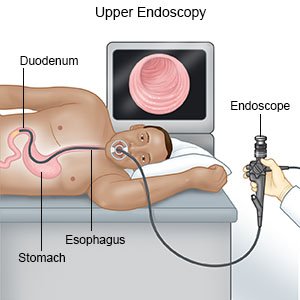Chronic Dysphagia
Medically reviewed by Drugs.com. Last updated on Jul 7, 2024.
Chronic dysphagia is trouble swallowing. You may have trouble moving food or liquid from your mouth to your esophagus or down to your stomach. You may have the problem when you eat, drink, or any time you try to swallow. Dysphagia is considered chronic when it continues longer than a few months.
WHILE YOU ARE HERE:
Informed consent
is a legal document that explains the tests, treatments, or procedures that you may need. Informed consent means you understand what will be done and can make decisions about what you want. You give your permission when you sign the consent form. You can have someone sign this form for you if you are not able to sign it. You have the right to understand your medical care in words you know. Before you sign the consent form, understand the risks and benefits of what will be done. Make sure all your questions are answered.
Medicines:
You may need medicine to reduce acid reflux or muscle spasms in your throat.
Tests:
- A water swallow screening test will show how well you swallow thinner liquids, such as water. Thinner liquids can make you choke more easily than thicker liquids. This test may show signs of dysphagia and aspiration. It can be used to help healthcare providers decide if you need other tests.
- Other swallow tests may show which parts of your throat or esophagus are not working well. These tests may include x-rays of your throat and esophagus. You may be given a thick liquid called barium to help your esophagus show up better on x-rays. These tests may also show if the position of your head affects the way you swallow.
- Endoscopy is a procedure that may show narrowing or inflammation in your esophagus.

- Manometry measures the pressure within the esophagus and stomach.
- pH monitoring is used to check your throat for acid reflux.
Treatment:
Surgery may be needed to widen your esophagus or treat other medical conditions that cause dysphagia. Surgery may also be used to place a feeding tube. Liquid nutrition and medicines can be put through the tube so you do not have to swallow them.
RISKS:
You have an increased risk for aspiration (movement of liquid and food into your lungs). Aspiration can cause frequent colds or lung infections. You may not get the nutrition you need. You may also become dehydrated. Your symptoms may become more severe or life-threatening.
CARE AGREEMENT:
You have the right to help plan your care. Learn about your health condition and how it may be treated. Discuss treatment options with your healthcare providers to decide what care you want to receive. You always have the right to refuse treatment.© Copyright Merative 2024 Information is for End User's use only and may not be sold, redistributed or otherwise used for commercial purposes.
The above information is an educational aid only. It is not intended as medical advice for individual conditions or treatments. Talk to your doctor, nurse or pharmacist before following any medical regimen to see if it is safe and effective for you.
Learn more about Chronic Dysphagia
Treatment options
Care guides
Further information
Always consult your healthcare provider to ensure the information displayed on this page applies to your personal circumstances.
